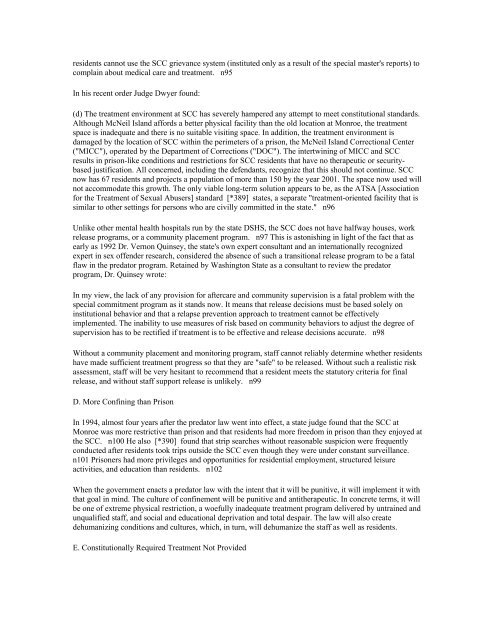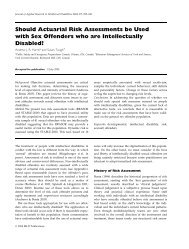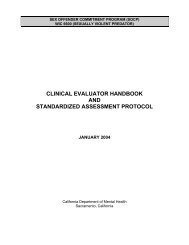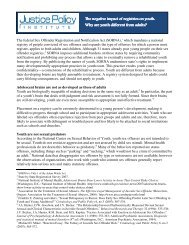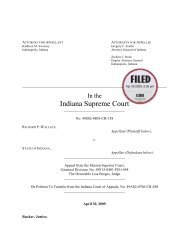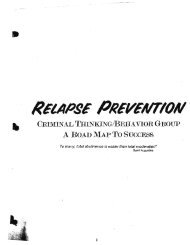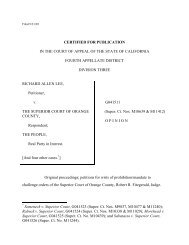Not content to simply establish that the defendant has been convicted of the requisite single offenserequired by the law, n68 prosecutors have refused to accept defense counsel's offer to stipulate to the priorconviction(s) and, instead, relitigate the prior sexual offense(s) <strong>for</strong> which the individual has beenconvicted. n69 The government may call past victims and have them testify again about the originalcrime(s). n70 Needless to say, testimony by the victim of a sex crime can easily anger a jury.Then the prosecutor will present an expert (usually one who only testifies on behalf of the prosecution)n71 who has concluded that the defendant is a sexual predator who suffers from a "mental abnormality" or"personality disorder" and is "likely" to commit another serious sex crime if he is released. n72 Afterhearing emotional testimony from victims n73 and an "expert" who has predicted that the defendant islikely to commit another serious sex crime if he is released, in most cases juries will play it safe andcommit the defendant. n74 (The subtext here is [*386] obvious and persuasive: If you release this personand he commits another sex crime, you, ladies and gentlemen of the jury, are responsible.)Not surprisingly, the state has won all but two of the cases it has taken to a full trial in Washington State.n75 If the government loses a case, it can simply retry it. n76 Because the Supreme Court has ruled thatthe predator law is "civil," and not "criminal," there is no double jeopardy protection against a retrial. Thisgives the government ample opportunity to strengthen its case and to use a different strategy on retrial.C. Secure Confinement ParamountIndividuals committed under the Washington statute are placed in a secure wing of a maximum-securityprison. This facility is called the Special Commitment Center ("SCC"). Even though it is nominally a "civilcommitment law," the Washington predator statute expressly prohibits these individuals from being held ina "state mental hospital." n77 Employees of the state Department of Social and Health services ("DSHS")run the SCC. Nonetheless, in many ways the SCC is run just like a prison. And, in many ways, SCCresidents are treated just like prisoners and, in some cases, even worse.From August 1990 to April 1998, the SCC was located in a wing within Monroe Penitentiary, a maximumsecurity prison in Monroe, Washington, run by the state Department of Corrections ("DOC"). n78 AtMonroe, electronic gates, high walls with razor wire on top, guard towers, and other heavy securitymeasures were in place. n79 An Assistant Attorney General has advised that guards may use deadly[*387] <strong>for</strong>ce to prevent any person civilly committed as a sexual predator from escaping. n80 In 1995 astate court found that, overall, SCC residents at Monroe do not have a "wider range of privileges" thanDOC prison inmates. n81In April 1998, the SCC was relocated to its own building within McNeil Island Correctional Center, amedium security prison located on McNeil Island. n82 Its superintendent has described the SCC atMcNeil as "a closed custody facility." n83 McNeil Island is near Steilacoom, Washington and isaccessible only by ferry. n84 Escape from McNeil is even more problematic because of the extremely coldwater and strong tidal currents of Puget Sound. n85 Even though escape from McNeil is very difficult,SCC residents have not been allowed off the unit. n86 Because the island is accessible only by ferry, visitsby family and by attorneys are difficult to arrange. n87 [*388]Prison guards from the DOC conduct frequent "walk-throughs," n88 and the DOC provides medical careto the residents as well as food services. n89 Over the objection of the SCC Superintendent and at theinsistence of the DOC, residents, unlike other civilly committed patients, are shackled and dressed in prisonjumpsuits when taken to the infirmary. n90 Conjugal visits, though af<strong>for</strong>ded prisoners in DOC facilities,are not af<strong>for</strong>ded residents at SCC. n91 Discipline (such as lockdowns or loss of outdoor exerciseprivileges) <strong>for</strong> infractions is called "behavioral intervention." n92 The SCC superintendent has determinedthat residents are not entitled to "due process" hearings of any sort because this is "treatment" notpunishment. n93 Thus, by characterizing discipline as treatment, SCC has avoided providing residentswith the due process protections that DOC must af<strong>for</strong>d convicted prisoners in prisons. n94 Likewise,
esidents cannot use the SCC grievance system (instituted only as a result of the special master's reports) tocomplain about medical care and treatment. n95In his recent order Judge Dwyer found:(d) The treatment environment at SCC has severely hampered any attempt to meet constitutional standards.Although McNeil Island af<strong>for</strong>ds a better physical facility than the old location at Monroe, the treatmentspace is inadequate and there is no suitable visiting space. In addition, the treatment environment isdamaged by the location of SCC within the perimeters of a prison, the McNeil Island Correctional Center("MICC"), operated by the Department of Corrections ("DOC"). The intertwining of MICC and SCCresults in prison-like conditions and restrictions <strong>for</strong> SCC residents that have no therapeutic or securitybasedjustification. All concerned, including the defendants, recognize that this should not continue. SCCnow has 67 residents and projects a population of more than 150 by the year 2001. The space now used willnot accommodate this growth. The only viable long-term solution appears to be, as the ATSA [Association<strong>for</strong> the Treatment of <strong>Sexual</strong> Abusers] standard [*389] states, a separate "treatment-oriented facility that issimilar to other settings <strong>for</strong> persons who are civilly committed in the state." n96Unlike other mental health hospitals run by the state DSHS, the SCC does not have halfway houses, workrelease programs, or a community placement program. n97 This is astonishing in light of the fact that asearly as 1992 Dr. Vernon Quinsey, the state's own expert consultant and an internationally recognizedexpert in sex offender research, considered the absence of such a transitional release program to be a fatalflaw in the predator program. Retained by Washington State as a consultant to review the predatorprogram, Dr. Quinsey wrote:In my view, the lack of any provision <strong>for</strong> aftercare and community supervision is a fatal problem with thespecial commitment program as it stands now. It means that release decisions must be based solely oninstitutional behavior and that a relapse prevention approach to treatment cannot be effectivelyimplemented. The inability to use measures of risk based on community behaviors to adjust the degree ofsupervision has to be rectified if treatment is to be effective and release decisions accurate. n98Without a community placement and monitoring program, staff cannot reliably determine whether residentshave made sufficient treatment progress so that they are "safe" to be released. Without such a realistic riskassessment, staff will be very hesitant to recommend that a resident meets the statutory criteria <strong>for</strong> finalrelease, and without staff support release is unlikely. n99D. More Confining than PrisonIn 1994, almost four years after the predator law went into effect, a state judge found that the SCC atMonroe was more restrictive than prison and that residents had more freedom in prison than they enjoyed atthe SCC. n100 He also [*390] found that strip searches without reasonable suspicion were frequentlyconducted after residents took trips outside the SCC even though they were under constant surveillance.n101 Prisoners had more privileges and opportunities <strong>for</strong> residential employment, structured leisureactivities, and education than residents. n102When the government enacts a predator law with the intent that it will be punitive, it will implement it withthat goal in mind. The culture of confinement will be punitive and antitherapeutic. In concrete terms, it willbe one of extreme physical restriction, a woefully inadequate treatment program delivered by untrained andunqualified staff, and social and educational deprivation and total despair. The law will also createdehumanizing conditions and cultures, which, in turn, will dehumanize the staff as well as residents.E. Constitutionally Required Treatment Not Provided
- Page 3 and 4: This Article will demonstrate that
- Page 5: In its findings, which were enacted
- Page 9 and 10: In her reports, the special master
- Page 11 and 12: shortly after the law went into eff
- Page 13 and 14: The Kansas experience confirms that
- Page 15 and 16: There is minimal trust between staf
- Page 17 and 18: For example, to satisfy its concern
- Page 19 and 20: TJ must develop a normative philoso
- Page 21 and 22: n6 David B. Wexler, New Directions
- Page 23 and 24: n34 See, e.g., Wash. Rev. Code § 7
- Page 25 and 26: n58 See DSM-IV, supra note 30, at 6
- Page 27 and 28: n82 See Thirteenth Report of the Sp
- Page 29 and 30: n110 Eleventh Report of the Special
- Page 31 and 32: commitment. See Wash. Rev. Code Ann
- Page 33 and 34: n171 See, e.g., Briefs of the State
- Page 35 and 36: and the bond formed between them. T
- Page 37 and 38: in predatory acts of violence if no
- Page 39 and 40: deprives one charged with a crime o
- Page 41 and 42: Time of Request: Wednesday, July 04


